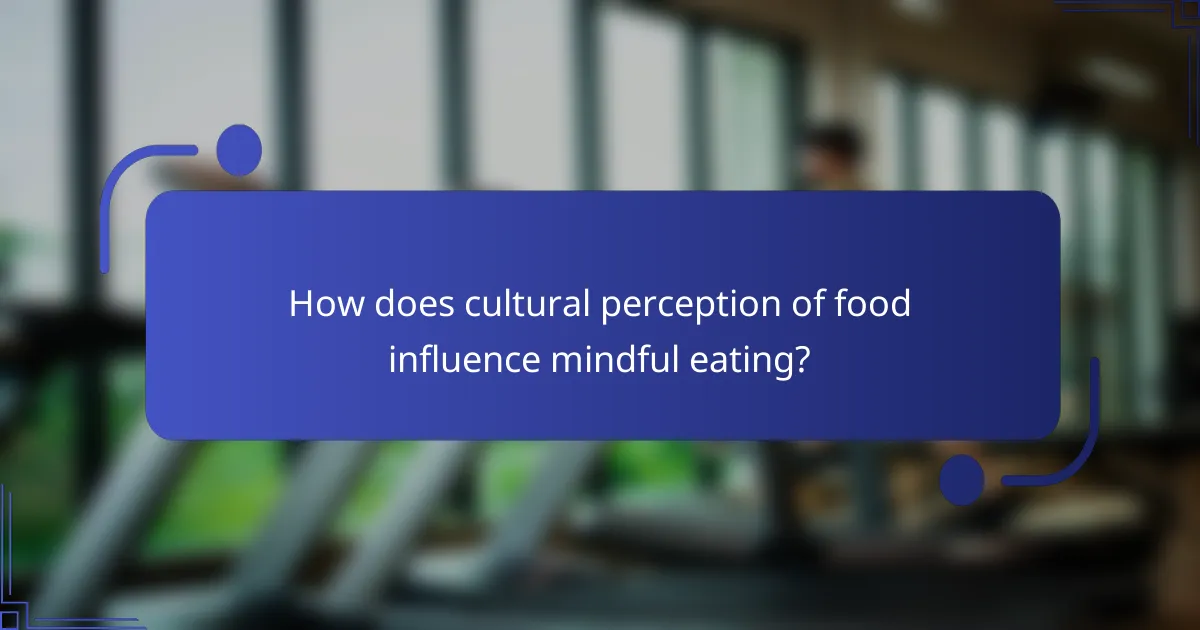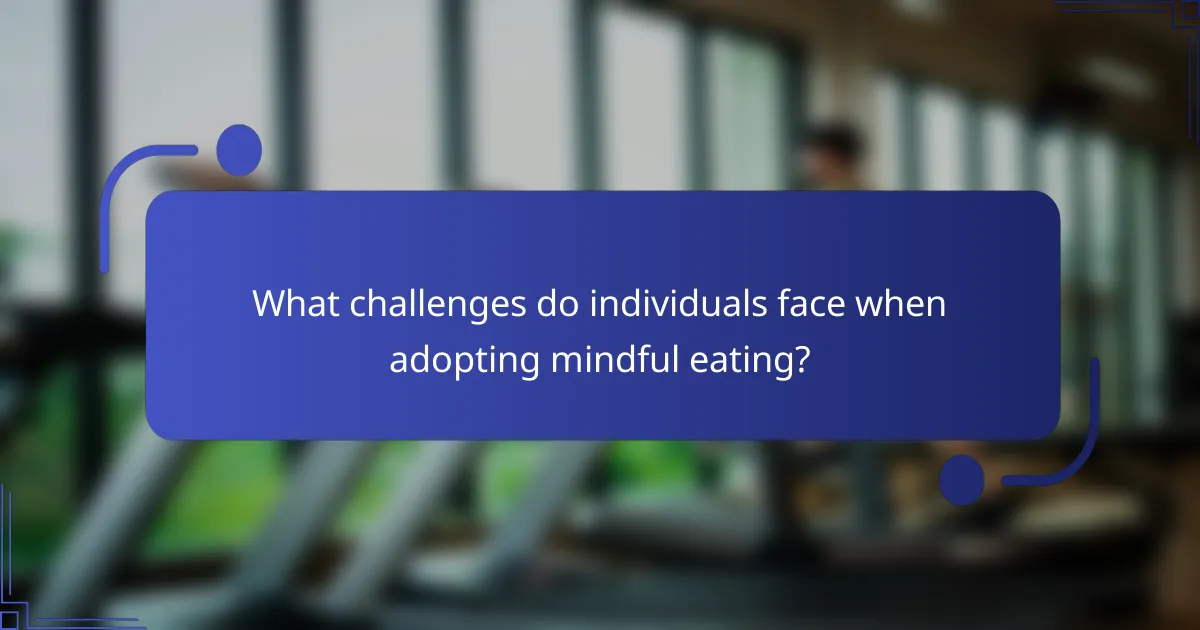Mindful eating offers significant benefits for weight management and emotional wellbeing. It enhances awareness of hunger cues, promotes healthier food choices, and reduces emotional eating. This practice fosters a positive relationship with food, leading to increased meal satisfaction and improved mental health. By understanding cultural influences and overcoming challenges, individuals can effectively incorporate mindful eating into their lives for lasting health benefits.

What are the key benefits of mindful eating for weight management?
Mindful eating significantly aids weight management and emotional wellbeing. It promotes awareness of hunger cues and enhances the eating experience, leading to healthier choices and portion control.
Practicing mindful eating can reduce emotional eating, as it encourages individuals to focus on their feelings and physical sensations rather than external triggers. This approach fosters a positive relationship with food, helping to cultivate long-term weight management strategies.
Research shows that mindful eating can lead to a reduction in calorie intake, with studies indicating a decrease of up to 20% in overall consumption. Additionally, individuals report increased satisfaction and enjoyment from meals, which can contribute to better emotional health.
In summary, the key benefits of mindful eating for weight management include improved awareness, reduced emotional eating, and enhanced meal satisfaction, all of which support sustainable weight control and emotional wellbeing.
How does mindful eating influence calorie intake?
Mindful eating significantly reduces calorie intake by promoting awareness of hunger and satiety cues. This practice encourages individuals to savor each bite, leading to slower eating and increased satisfaction. Research shows that mindful eaters often consume fewer calories without feeling deprived. By focusing on food’s flavors and textures, they enhance emotional wellbeing and reduce emotional eating triggers. This approach fosters a healthier relationship with food, supporting effective weight management over time.
What role does mindful eating play in appetite regulation?
Mindful eating significantly aids appetite regulation by promoting awareness of hunger cues and emotional triggers. This practice encourages individuals to focus on their eating experiences, leading to better portion control and reduced emotional eating. Research shows that mindful eaters often experience lower body mass index (BMI) and improved emotional wellbeing. By fostering a deeper connection with food, mindful eating can enhance satisfaction and prevent overeating.
How can mindful eating improve food choices?
Mindful eating enhances food choices by fostering awareness of hunger cues and emotional triggers. This practice encourages individuals to savor each bite, leading to better portion control and reduced overeating. Research indicates that mindful eaters often make healthier food selections, prioritizing nutrient-dense options over processed foods. Additionally, this approach can improve emotional wellbeing by reducing stress related to eating, promoting a healthier relationship with food.
What psychological benefits does mindful eating offer for weight management?
Mindful eating offers significant psychological benefits for weight management by promoting awareness and self-regulation. This practice enhances emotional wellbeing, reduces stress-related eating, and fosters a healthier relationship with food. Individuals often report improved body image and increased satisfaction with meals. As a result, mindful eating can lead to sustainable weight loss and better overall mental health.

How does mindful eating contribute to emotional wellbeing?
Mindful eating significantly enhances emotional wellbeing by fostering a positive relationship with food. This practice encourages awareness of hunger cues and emotional triggers, promoting healthier choices. Research indicates that mindful eaters experience reduced stress and improved mood, as they engage fully with their meals. Additionally, this approach can lead to better self-esteem and body image, contributing to overall mental health. Practicing mindful eating may also reduce binge eating episodes, allowing individuals to cultivate a more balanced emotional state.
What is the connection between mindful eating and stress reduction?
Mindful eating significantly reduces stress by promoting awareness of food choices and fostering a positive relationship with eating. This practice encourages individuals to slow down and savor each bite, which can lower anxiety levels. Research indicates that mindful eating can enhance emotional wellbeing, leading to better stress management. It helps individuals recognize hunger and fullness cues, preventing overeating and the emotional distress associated with it. Engaging fully in the eating experience can create a sense of calm, contributing to overall mental health.
How can mindful eating enhance self-awareness and emotional regulation?
Mindful eating enhances self-awareness and emotional regulation by fostering a deeper connection to one’s hunger cues and emotional states. This practice encourages individuals to recognize their feelings towards food, leading to healthier choices and reduced emotional eating. By focusing on the present moment, mindful eating cultivates an awareness of bodily sensations and thoughts, promoting better decision-making regarding food intake. As a result, individuals can develop a more balanced relationship with food, improving both weight management and emotional wellbeing.
What impact does mindful eating have on body image and self-esteem?
Mindful eating positively impacts body image and self-esteem by promoting a healthier relationship with food. It encourages individuals to focus on their hunger cues, leading to better food choices and reduced emotional eating. As a result, people often experience increased body satisfaction and improved self-worth. Studies show that mindful eating can decrease negative body image perceptions and enhance overall emotional wellbeing. By fostering awareness and acceptance, mindful eating helps individuals cultivate a more positive self-image.

Which techniques are effective for practicing mindful eating?
Effective techniques for practicing mindful eating include focusing on sensory experiences, eliminating distractions, and listening to hunger cues. These methods enhance weight management and emotional wellbeing.
1. Engage your senses: Pay attention to the taste, texture, and aroma of food to deepen your connection with meals.
2. Remove distractions: Avoid screens and multitasking during meals to promote awareness and satisfaction.
3. Listen to hunger signals: Eat when hungry and stop when satisfied to prevent overeating.
4. Chew slowly: Take time to chew each bite thoroughly, allowing your body to recognize fullness.
5. Reflect on food choices: Consider the nutritional value and emotional reasons behind food selections.
6. Practice gratitude: Acknowledge the effort that goes into food preparation and the nourishment it provides.
What are some practical steps to incorporate mindfulness into meals?
Incorporating mindfulness into meals can enhance weight management and emotional wellbeing. Start by creating a calm eating environment, free from distractions.
1. Prepare your meals with intention, focusing on fresh ingredients.
2. Chew slowly and savor each bite, paying attention to flavors and textures.
3. Listen to your hunger cues, eating only when genuinely hungry.
4. Reflect on your food choices, considering their impact on your health and mood.
These steps promote a deeper connection with food, fostering healthier habits and emotional balance.
How can mindful eating be practiced in social settings?
Mindful eating can be practiced in social settings by focusing on the experience rather than distractions. Engage fully with the food, savor each bite, and listen to hunger cues. This approach promotes weight management and emotional wellbeing by reducing overeating and enhancing enjoyment.
In social situations, choose smaller portions and take time to chew thoroughly. Communicate with others about food choices, fostering a supportive environment. Being present helps manage emotional triggers associated with eating, leading to healthier choices and improved mood.
What tools and resources support mindful eating practices?
Mindful eating practices are supported by various tools and resources that enhance awareness and promote healthier eating habits. These include mindfulness apps, guided meditation resources, and educational materials on nutrition.
Mindfulness apps provide structured practices to cultivate awareness during meals, often featuring reminders and exercises. Guided meditations focus on enhancing the eating experience, fostering a deeper connection with food. Educational materials, such as books and articles, offer insights into the principles of mindful eating, its benefits for weight management, and emotional wellbeing.
Together, these resources create a supportive framework for individuals seeking to adopt mindful eating practices effectively.

How does cultural perception of food influence mindful eating?
Cultural perception of food significantly influences mindful eating practices. Different cultures shape attitudes toward food, which affects how individuals engage with their meals.
For example, cultures that emphasize communal dining encourage slower eating and greater awareness of food, enhancing emotional wellbeing. In contrast, cultures focused on fast-paced eating may hinder mindfulness, leading to overeating and weight gain.
Research shows that mindful eating can improve weight management by promoting healthier food choices and reducing emotional eating. Engaging with food through a cultural lens fosters appreciation, leading to more satisfying eating experiences.
Ultimately, understanding cultural influences can enhance the benefits of mindful eating, supporting both weight management and emotional wellbeing.
What are the differences in mindful eating practices across cultures?
Mindful eating practices vary significantly across cultures, influencing weight management and emotional wellbeing. Different cultures emphasize unique attributes of mindful eating, such as communal dining, food rituals, and the relationship with nature.
For instance, in Japanese culture, eating is often a meditative practice, focusing on presentation and seasonal ingredients, which enhances appreciation and reduces overeating. In contrast, Mediterranean cultures emphasize social interactions during meals, fostering emotional connections that promote satisfaction and contentment.
These cultural differences can lead to rare eating practices, such as the Italian concept of “la dolce vita,” where enjoying food is tied to emotional health, encouraging slower eating and savoring flavors. Such practices contribute to emotional wellbeing while supporting weight management through mindful consumption.
How do regional dietary habits affect the implementation of mindful eating?
Regional dietary habits significantly influence the practice of mindful eating. Cultural norms shape food choices and eating rituals, impacting emotional wellbeing and weight management.
For instance, Mediterranean diets emphasize fresh produce and communal meals, promoting slower eating and greater mindfulness. In contrast, fast-paced Western eating habits often lead to mindless consumption, hindering emotional connection to food.
Research indicates that individuals from cultures that prioritize family meals report higher levels of satisfaction and lower stress, which can enhance the benefits of mindful eating. Adapting mindful eating practices to align with regional dietary habits can improve their effectiveness for weight management and emotional health.
Ultimately, understanding these regional variations allows for a more personalized approach to mindful eating, fostering deeper emotional connections and healthier eating patterns.

What challenges do individuals face when adopting mindful eating?
Individuals face various challenges when adopting mindful eating, including emotional triggers and environmental distractions. These factors can hinder awareness of hunger cues and food choices. Stress and social situations often lead to mindless eating, making it difficult to focus on the present moment. Additionally, ingrained habits and cultural norms may conflict with the practice of mindfulness. Developing strategies to overcome these barriers is essential for effective weight management and emotional wellbeing.
How can one overcome common obstacles to mindful eating?
To overcome common obstacles to mindful eating, one can practice self-awareness and set realistic goals. Identifying triggers for emotional eating helps in managing cravings. Creating a distraction-free environment during meals enhances focus on food. Additionally, maintaining a regular eating schedule supports consistent mindful practices.
What misconceptions exist about mindful eating?
Misconceptions about mindful eating often hinder its effectiveness for weight management and emotional wellbeing. Many believe that it is simply about eating less, but it actually focuses on awareness and enjoyment of food. Another common myth is that mindful eating requires strict rules or diets, while it encourages flexibility and intuitive choices. Some think it only benefits weight loss, but it also enhances emotional health by fostering a positive relationship with food. Lastly, many underestimate the time commitment, not realizing that even brief moments of mindfulness can yield significant benefits.

What are the long-term effects of mindful eating on health and wellbeing?
Mindful eating positively impacts long-term health and wellbeing by promoting weight management and emotional stability. It encourages awareness of hunger cues and fosters a healthier relationship with food.
Research shows that individuals practicing mindful eating often experience reduced emotional eating, leading to lower body weight and improved self-esteem. A study indicated that participants who engaged in mindful eating lost an average of 5% of their body weight over six months.
Additionally, mindful eating can enhance overall mental health by reducing anxiety and stress levels. This practice cultivates a sense of presence, allowing individuals to enjoy meals and recognize satiety signals.
In summary, the long-term effects of mindful eating include improved weight management, enhanced emotional wellbeing, and a healthier relationship with food.
How does mindful eating influence sustainable weight management?
Mindful eating significantly enhances sustainable weight management by fostering awareness of hunger cues and food choices. This practice encourages individuals to savor each bite, leading to reduced overeating and improved satisfaction with smaller portions. Research indicates that mindful eaters often experience lower body mass indexes (BMIs) and better emotional wellbeing. By promoting a positive relationship with food, mindful eating reduces stress and emotional eating, which are common barriers to effective weight management.
What research supports the benefits of mindful eating over time?
Research consistently shows that mindful eating supports weight management and emotional wellbeing over time. Studies indicate that individuals practicing mindful eating report lower body mass index (BMI) and improved emotional health. For instance, a meta-analysis found that mindful eating interventions led to significant weight loss and reduced binge eating behaviors. Additionally, participants experienced enhanced emotional regulation and decreased anxiety levels. These findings suggest that mindful eating fosters a healthier relationship with food, promoting sustainable weight management and emotional resilience.
What best practices can enhance the effectiveness of mindful eating?
Practicing mindful eating enhances weight management and emotional wellbeing through several best practices. Focus on eating slowly to savor flavors and recognize hunger cues.
1. Eliminate distractions during meals to increase awareness of food choices.
2. Use smaller plates to control portion sizes and prevent overeating.
3. Chew thoroughly to aid digestion and enhance satisfaction.
4. Reflect on emotional triggers that influence eating habits to foster healthier responses.
These strategies promote a positive relationship with food, supporting lasting changes in behavior and mindset.


